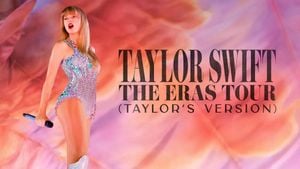LOS ANGELES – After 20 years of anticipation, the film adaptation of the universally beloved musical Wicked has thrived remarkably at the box office, marking not only the biggest opening weekend for any movie based on a Broadway show but igniting discussions about pay disparities among the leading stars, Ariana Grande and Cynthia Erivo.
Wicked, which opened on November 22, has achieved impressive financial success, grossing over $164 million worldwide during its debut weekend, with domestic earnings of $114 million. This substantial figure has positioned it as the highest global and domestic opener for any musical film, surpassing the previous record held by Les Miserables (2012).
Director Jon M. Chu, known for hits like Crazy Rich Asians, brought Wicked to life, and his ambitious vision was shared by his chosen cast, which includes Grande and Erivo. The chemistry felt during rehearsals reportedly solidified Chu's belief in the film’s potential. He expressed during the film’s promotion, "We needed to shoot for the moon. I didn't know if the studio would be down, but we all had to jump together. We'll see, but we're gonna go for it.”
With the film finally reaching audiences, initial reviews highlight both the dazzling performances and visuals. Critics have praised how the film captured the spirit of the original musical, with Erivo’s performance as Elphaba receiving particularly high accolades, described by some as “hitting all the film’s high notes with ease.” Meanwhile, Grande is noted for her strong portrayal of Glinda.
Despite the success of the film, controversy emerged around claims of pay gaps between the two leads. Rumors suggested Grande was compensated $15 million for her role, compared to Erivo's mere $1 million, leading to heated discussions across social media platforms including TikTok and Reddit. Many speculated this disparity was grounded on their respective fame levels, with Grande being one of the most recognized pop stars globally.
Universal Pictures addressed the controversy, firmly stating, “Reports of pay disparity between Cynthia and Ariana are completely false and based on internet fodder. The women received equal pay for their work on Wicked.” This statement aimed to quell the chatter and reaffirm equal compensation for both actresses, irrespective of their individual fan bases or net worth.
Fans and critics took to various social media platforms, some expressing their support for Erivo, long hailed for her Broadway talents, and others defending Grande's substantial career achievements. One supporter commented, “It’s about time women started supporting each other instead of tearing each other down. Both are immensely talented.”
With the buzz continuing, Wicked showcases not only its box office prowess but also raises important discussions about gender equality and fair pay within the industry, especially following campaigns to address similar issues across Hollywood. This concern feels particularly significant as the entertainment industry navigates the return to normalcy post-COVID-19.
The anticipation surrounding Wicked doesn't end here; plans for Wicked: Part Two are already underway, with its release scheduled for November 21, 2025. Director Chu explained the need for two parts, citing the extensive source material and narrative depth as reasons for splitting the story, ensuring fans will receive the complete Wicked experience.
Overall, as Wicked continues to draw audiences and break records, it’s shaping up to be one of the most notable film event of the year, positioning itself uniquely within the cinematic and theatrical discussions.
While the box office tallies may ebb and flow, the focus on equitable pay for actresses like Grande and Erivo will likely continue. While Wicked thrives and creates excitement, it also amplifies the conversations on professional equity and the narratives we choose to amplify in the media. The success of this adaptation, both financially and critically, will certainly resonate well within the industry and establish benchmarks for future productions.



